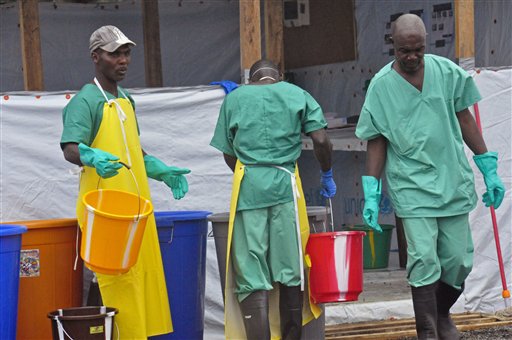Liberia: 3 receiving untested Ebola drug improving

Health workers with buckets, as part of their Ebola virus prevention protective gear, at an Ebola treatment center in the city of Monrovia, Liberia, Monday, Aug. 18, 2014. Liberia’s armed forces were given orders to shoot people trying to illegally cross the border from neighboring Sierra Leone, which is closed to stem the spread of Ebola, local newspaper Daily Observer reported Monday. AP
MONROVIA, Liberia— Three Liberian health workers receiving an experimental drug to treat Ebola are showing signs of recovery, officials said Tuesday.
The three are being treated with the last known doses of ZMapp, which had earlier been given to two infected Americans and a Spaniard. The Americans are also improving, but the Spaniard died.
“The medical professionals have informed the Liberian information ministry their progress is ‘remarkable,'” the ministry said in a statement, adding that they are showing “very positive signs of recovery.”
Experts have cautioned that it’s unclear if ZMapp, which had never before been tested in humans, is effective. Even if it is, the California-based maker of the drug has said more supplies of the drug won’t be available for months.
In the meantime, experts say the best way to stop the spread of Ebola in West Africa is to identify the sick, isolate them from the healthy and monitor everyone with whom they have been in contact.
Article continues after this advertisementMore than 1,200 people have died from Ebola in Guinea, Liberia, Sierra Leone and Nigeria in the current outbreak and more than 2,200 have been sickened, the World Health Organization said Tuesday.
Article continues after this advertisementAuthorities have struggled to treat and isolate the sick, partially because of a fear that treatment centers are places where people go to die and a lack of confidence that officials are doing enough to protect the healthy. Many sick people have hidden in their homes, relatives have sometimes taken their loved ones away from health centers, and mobs have occasionally attacked health workers.
On Saturday, residents of the West Point slum in Liberia’s capital of Monrovia attacked a center where people were being monitored for Ebola. The raid was a result of fears that people with the disease were being brought there from all over the country, the Information Ministry said Tuesday.
During the raid, dozens of people, who were waiting to be screened for Ebola, fled the facility. Looters made off with items, including bloody sheets and mattresses, that could spread the infection.
All the patients who fled are now being screened at a hospital in Monrovia and those who tested positive are being treated, the ministry said Tuesday. It was unclear how many of the 37 who fled were confirmed with Ebola. In addition, residents of the West Point slum have agreed to return any stolen items to the holding center, officials said.
Now there is a new search for a pastor who ran away from another Ebola treatment center outside Monrovia, according to the Health Ministry. The statement did not say whether the man had tested positive for Ebola, but state radio was broadcasting messages asking the public to look out for the preacher.
Still, the WHO said Tuesday that it is seeing some encouraging signs in other parts of West Africa. In Guinea people from villages that had previously rejected outside help were beginning to seek medical care, said a WHO statement. The statement said the situation is “less alarming” in Guinea than it is in Liberia and Sierra Leone.
Although the outbreak began in Guinea, Liberia now has recorded the highest number of deaths and Sierra Leone the highest number of cases.
The WHO also said that there is “cautious optimism” that the spread of the virus in Nigeria can be stopped. So far, all recorded cases have been linked to one man, who flew from Liberia to Nigeria while he was already infected.
“The outbreak is not under control,” the statement said, despite the encouraging signs. “As recent experience shows, progress is fragile, with a real risk that the outbreak could experience another flare-up.”
In an effort to stem the spread of Ebola, officials have imposed quarantines and travel restrictions for the sick and those in contact with them, sometimes shutting off whole villages and counties.
Those restrictions are limiting access to food and other basic necessities, said the WHO. The U.N. World Food Program has said that it is preparing to deliver food to 1 million people over the next three months.
RELATED STORIES
8 things to know about the deadly Ebola virus
WHO declares Ebola virus ‘health emergency of international concern’